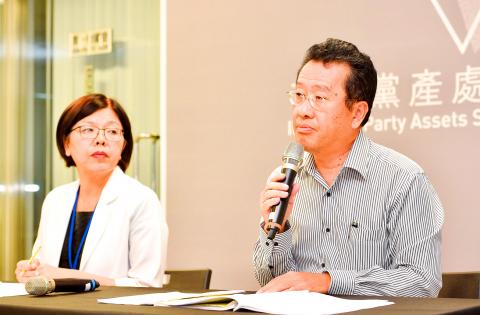The Ill-gotten Party Assets Settlement Committee is to send officials to the Chinese Nationalist Party’s (KMT) archives to examine records related to the party’s assets.
“We originally planned to visit the KMT’s archives on Friday, but had to postpone the visit until tomorrow [today] after the KMT told us that officials in charge of the records would not be there on Friday,” committee spokeswoman Shih Chin-fang (施錦芳) said in an interview with the Central News Agency yesterday.
The committee plans to send officials to the archives today, but that could change due to reports of planned protests against the committee’s actions, Shih said.

Photo: Peter Lo, Taipei Times
The Executive Yuan-affiliated committee has interviewed former KMT treasurers Liu Tai-ying (劉泰英) and Hsu Li-teh (徐立德), Shih said, declining to reveal the details of their conversations.
The plan to examine the KMT’s historical records came after committee Chairman Wellington Koo (顧立雄) questioned the source of the KMT’s income earlier this month.
Party membership fees — which the KMT said it used to fund its affiliate Central Investment Co (中央投資公司) — only contributed 3 to 4 percent of its income in the 1950s, when it derived between 50 percent and 70 percent of its income from government subsidies, Koo said.
While government subsidies are a legal source of income for a political party, Koo questioned whether the KMT had abused its power during its authoritarian rule to secure the subsidies.
As the matter would require an audit of the KMT Central Standing Committee’s meeting minutes from that era, the Ill-gotten Party Assets Settlement Committee reached an agreement in negotiations to request that the KMT’s archives provide the necessary documents.
The Ill-gotten Party Assets Settlement Committee two weeks ago issued an official letter to the KMT’s archives requesting that it provide relevant meeting minutes within five days, said a source familiar with the matter, who spoke on condition of anonymity.
“However, the KMT requested a deadline extension, citing a need for more time to find and organize the documents,” the source said.
When asked for comment on Saturday, KMT Culture and Communications Committee deputy director Hu Wen-chi (胡文琦) said the party would handle the issue calmly and in accordance with the law.
“Nevertheless, I have to remind the illegal and unconstitutional Ill-gotten Party Assets Settlement Committee that it will only be conducting an administrative investigation, not a judicial one,” Hu said.
The KMT plans to record the entire visit, Hu said, urging the Ill-gotten Party Assets Settlement Committee to take into account public perception of its actions and adhere to the ideals of procedural justice, democracy and rule of law.

Taiwanese can file complaints with the Tourism Administration to report travel agencies if their activities caused termination of a person’s citizenship, Mainland Affairs Council Minister Chiu Chui-cheng (邱垂正) said yesterday, after a podcaster highlighted a case in which a person’s citizenship was canceled for receiving a single-use Chinese passport to enter Russia. The council is aware of incidents in which people who signed up through Chinese travel agencies for tours of Russia were told they could obtain Russian visas and fast-track border clearance, Chiu told reporters on the sidelines of an event in Taipei. However, the travel agencies actually applied

Japanese footwear brand Onitsuka Tiger today issued a public apology and said it has suspended an employee amid allegations that the staff member discriminated against a Vietnamese customer at its Taipei 101 store. Posting on the social media platform Threads yesterday, a user said that an employee at the store said that “those shoes are very expensive” when her friend, who is a migrant worker from Vietnam, asked for assistance. The employee then ignored her until she asked again, to which she replied: "We don't have a size 37." The post had amassed nearly 26,000 likes and 916 comments as of this

New measures aimed at making Taiwan more attractive to foreign professionals came into effect this month, the National Development Council said yesterday. Among the changes, international students at Taiwanese universities would be able to work in Taiwan without a work permit in the two years after they graduate, explainer materials provided by the council said. In addition, foreign nationals who graduated from one of the world’s top 200 universities within the past five years can also apply for a two-year open work permit. Previously, those graduates would have needed to apply for a work permit using point-based criteria or have a Taiwanese company

The Shilin District Prosecutors’ Office yesterday indicted two Taiwanese and issued a wanted notice for Pete Liu (劉作虎), founder of Shenzhen-based smartphone manufacturer OnePlus Technology Co (萬普拉斯科技), for allegedly contravening the Act Governing Relations Between the People of the Taiwan Area and the Mainland Area (臺灣地區與大陸地區人民關係條例) by poaching 70 engineers in Taiwan. Liu allegedly traveled to Taiwan at the end of 2014 and met with a Taiwanese man surnamed Lin (林) to discuss establishing a mobile software research and development (R&D) team in Taiwan, prosecutors said. Without approval from the government, Lin, following Liu’s instructions, recruited more than 70 software